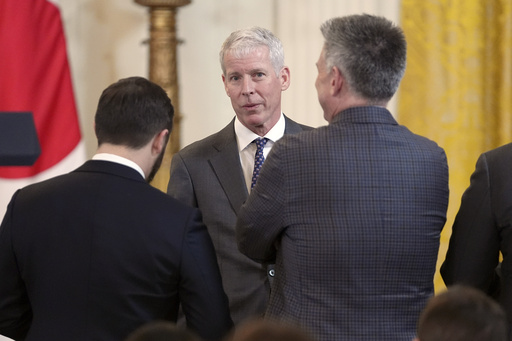
In a significant move, President Trump signed an executive order on Friday to establish a National Energy Dominance Council, aiming to expedite the increase of domestic oil and gas production, which is currently at record levels. The administration also revealed that it has conditionally approved export authorization for a major liquefied natural gas (LNG) project in Louisiana, the first such approval since President Biden paused new LNG export considerations a year prior.
Trump has instructed Interior Secretary Doug Burgum to reverse Biden’s recent prohibition on offshore oil drilling along the East and West coasts. He criticized Biden’s last-minute decision, which affected over 625 million acres of offshore territory, claiming it severely diminished the nation’s resource potential. Moreover, Trump announced intentions to revive a previously canceled pipeline intended to transport natural gas from Pennsylvania to New York, which he believes could reduce energy costs in the Northeast by 70%.
These actions reflect Trump’s dedication to boosting U.S. energy production, especially from fossil fuel sources like oil and natural gas, while also working to eliminate regulatory hurdles that could hinder progress. Emphasizing the country’s energy capabilities, Trump referred to American fossil fuels as “liquid gold” and urged energy firms to increase exports to international allies in Europe and beyond. He expressed confidence that the U.S. could achieve unprecedented revenue from energy resources.
The National Energy Dominance Council will be chaired by Burgum and will have comprehensive regulatory authority concerning federal energy permit applications, production, and transportation. Trump’s vision for the council includes reducing bureaucratic obstacles, encouraging private investments, and prioritizing innovation, distancing it from perceived “unnecessary regulations.” Trump also pointed out plans to roll back energy efficiency standards for household appliances and stated that changes would be made regarding California’s stringent air pollution rules for vehicles, as directed by EPA Administrator Lee Zeldin.
In January 2024, Biden announced a delay in new natural gas export terminals, despite increased gas shipments to Europe and Asia following Russia’s invasion of Ukraine. This decision aligned with environmentalists’ concerns regarding the potential increase in LNG exports contributing to harmful greenhouse gas emissions, which runs counter to Biden’s goal of halving climate pollution by 2030. However, this policy angered the oil and gas sector and Republican legislators, who viewed it as a broken commitment to allies reliant on LNG for heating and other essential needs.
Trump has been vocal about reversing Biden’s policies, and his first executive order after taking office aimed at lifting the aforementioned suspension. Energy Secretary Chris Wright was present with Trump in the Oval Office, announcing the conditional approval for Commonwealth LNG in Louisiana, which plans to export approximately 9.5 million tons of LNG annually from a new facility.
Wright characterized the conditional approval as a move to “unpause” actions that were previously stalled under Biden’s administration. He emphasized the benefits of exporting American LNG for both the economy and job creation, stating his pride in collaborating with Trump to re-establish American energy exports.
Commonwealth LNG’s leadership praised the administration’s efforts, perceiving them as a strong commitment to the American energy sector. While this approval is contingent upon a ruling from the independent Federal Energy Regulatory Commission, the company is optimistic about receiving the green light for the project this summer, with plans for a final investment decision by September and anticipated production launch in early 2029.
Biden’s decision to restrict offshore drilling shortly before leaving office was based on the authority granted by the Outer Continental Shelf Lands Act, which allows the president to withdraw areas deemed too sensitive for mineral leasing. Although Biden’s action safeguards more than 625 million acres of federal waters, reversing it may pose significant challenges for Trump, likely requiring Congressional action to undo.
Trump argued that Biden’s decision amounted to a significant loss for the U.S., stripping away high-value resources from the national balance sheet. He expressed optimism about legally overturning this order, asserting that the resources would soon be restored to the U.S. energy equation.

